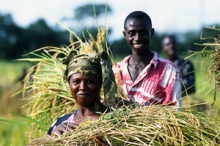On 28 March, an informal meeting on biocultural community protocols was organized by Natural Justice and hosted by PACOS in Sabah, Malaysia. Anne Lasimbang (PACOS) provided background on the first community protocols developed in Sabah in 1998. Community researchers from Kampung Buayan presented on the protocol developed by the communities of Ulu Papar over the past two years with support from the Global Diversity Foundation. Natural Justice discussed activities undertaken in the Regional Initiatives on Biocultural Community Protocols and introduced the newly released Biocultural Community Protocols Toolkit for Community Facilitators.
Borneo Conservancy highlighted the potential wider applications of community protocols in the context of different legal frameworks. A representative of LEAP and the Indigenous Peoples Network of Malaysia (JOAS) noted the need for such tools that can help amplify communities' voices, particularly in partnerships with government agencies and the private sector. The organizations in attendance agreed to further explore opportunities for coordination and joint strategies around community protocols in Sabah, including to advocate for recognition of customary systems of resource governance (known as tagal).
Borneo Conservancy highlighted the potential wider applications of community protocols in the context of different legal frameworks. A representative of LEAP and the Indigenous Peoples Network of Malaysia (JOAS) noted the need for such tools that can help amplify communities' voices, particularly in partnerships with government agencies and the private sector. The organizations in attendance agreed to further explore opportunities for coordination and joint strategies around community protocols in Sabah, including to advocate for recognition of customary systems of resource governance (known as tagal).






.jpg)

















